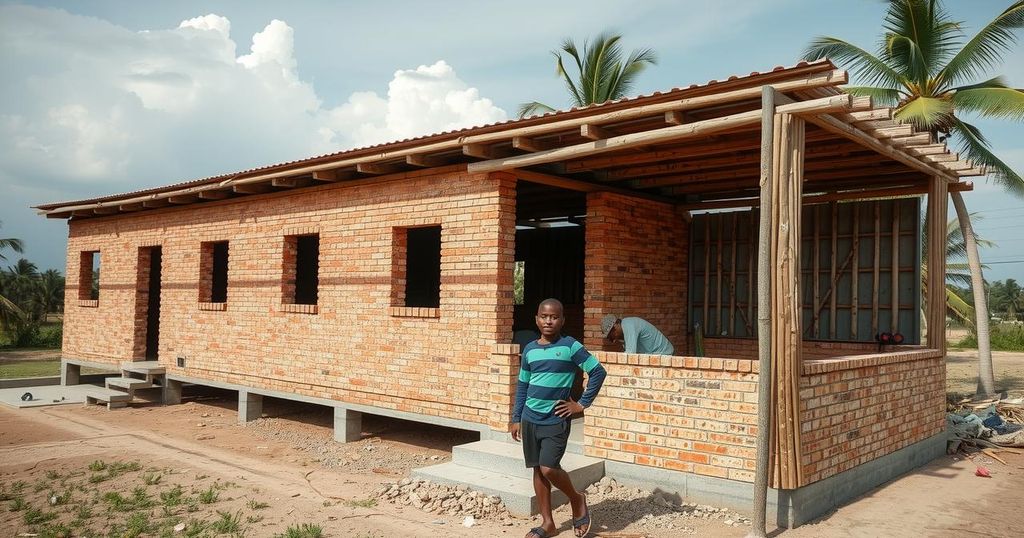Mozambique Initiates Shelter Construction for Cyclone Chido Victims
Following Cyclone Chido, Mozambique has started building durable shelters for affected victims, amidst reported fatalities and injuries. The government is committed to using resilient materials and improving construction training to mitigate future storm impacts. With ongoing support from UNICEF and other agencies, efforts include immediate assistance for thousands facing infrastructure destruction, while concerns rise over a potential worsening of cholera outbreaks due to the storm’s devastation.
Mozambique has commenced the construction of permanent shelters for the victims of Cyclone Chido, which devastated three northern regions of the country last Sunday. The cyclone led to the loss of at least 70 lives and left 600 individuals injured. Trade and Industry Minister Silvino Moreno reported that the government is actively providing assistance to the affected populations in collaboration with international partners. During his visit to Nampula, one of the hardest-hit provinces, Moreno emphasized the importance of utilizing resilient materials for the new shelters to prevent similar destruction in the future.
Many homes in the impacted regions were constructed using mud and reeds, which proved inadequate against the cyclone’s intensity. Minister Moreno further stressed the need for improved construction training for the local population to ensure the safety and durability of future homes. Prior to striking Mozambique, Cyclone Chido wreaked havoc in Mayotte, a group of French islands, resulting in significant destruction and increased risks for vulnerable communities, including asylum seekers and refugees.
The cyclone also affected southern Malawi, where strong winds and rains led to extensive damage. According to Mozambique’s meteorological agency, the region should prepare for additional storms in the upcoming three months of the rainy season. UNICEF estimates that approximately 174,000 individuals have been impacted overall, and this number may rise as further assessments are conducted. In addition to residential destruction, thousands of classrooms and at least 20 health facilities suffered damage.
UNICEF’s field office head, Michael Chimedza, stated that the organization has mobilized resources to assist 50,000 people on an immediate basis and has allocated funding for local response training. The cyclone’s path included Cabo Delgado and Niassa provinces, which resulted in over 25,000 families losing access to electricity and witnessing damage to vital infrastructure such as health units, roads, and water supply sources. Aid agencies have expressed concerns that the ongoing cholera outbreak in the region is likely to worsen due to the latest calamity.
The article discusses the aftermath of Cyclone Chido, which impacted Mozambique and other regions, highlighting the immediate responses such as shelter construction for the victims. It underscores the need for resilient housing structures to withstand future storms, particularly in areas where previous infrastructures failed. The cyclone has thus raised awareness regarding the training and resources required to bolster community resilience against natural disasters. Additionally, it touches on the ongoing humanitarian crises, including a cholera outbreak exacerbated by the cyclone’s destruction.
In the wake of Cyclone Chido’s devastation, Mozambique is taking essential steps to rebuild and provide shelter for its affected citizens. The government, in cooperation with international partners, is prioritizing the construction of durable homes and providing vital resources for recovery. Furthermore, the looming threat of additional storms underlines the necessity of improved preparation and training to ensure the community’s safety and resilience against future disasters.
Original Source: www.voanews.com




Post Comment